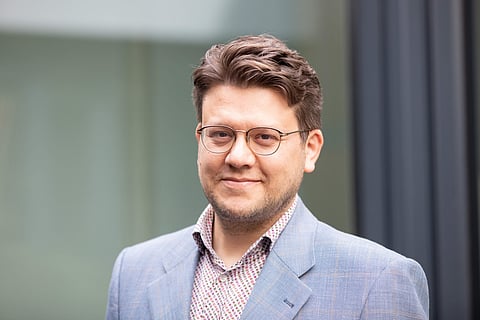India has an entrepreneurial spirit deeply rooted in its culture: University of Basel's Christian Schneider
With a keen focus on biotechnology and bio industries all over the world, the Government of Telangana's annual convention BioAsia 2020 was held in Hyderabad last month. Many events were a part of the convention including the Start-up Stage where about 75 start-ups from across the country were given the opportunity to interact with global leaders. Among the officials who graced the occasion was Christian Schneider, Head, Innovation and Entrepreneurship Cell at University of Basel, Switzerland. He was not only leading a delegation of start-ups but also wanted to engage with India's innovation centres. We caught up with him for a quick chat about AI, start-ups and their new collaborations. Excerpts from the interview:
1. In what ways would you like to engage with India and why specifically in the pharma and biotech industry?
University of Basel's Innovation Centre supports future entrepreneurs in gaining the necessary skills and connections for success. We would like our entrepreneurs to think globally and build new bridges abroad, to reach a higher impact. Most of our start-ups are active in the life sciences and healthcare field and Basel is one of the main hubs for life sciences worldwide. India is a very dynamic country with an entrepreneurial spirit deeply rooted in its culture. Through the right Indian partners, we hope to test and scale our solutions to a large group of customers. We also welcome Indian start-ups with open arms and would love to partner with them for research and clinical validation and to develop the Basel ecosystem together. To this end, we have signed collaboration agreements with WE Hub, an incubator for female entrepreneurs in Hyderabad; C-Camp, an incubator and accelerator for healthcare and technologies in Bengaluru (presence nationally) and Mazumdar Shaw Medical Foundation, an incubator at Narayana Health for the clinical support of start-ups in Bengaluru.
2. Tell us about the role you envision for AI in the future. How can youngsters help speed up the process?
For the successful application of AI, especially in healthcare, we need to improve systemic thinking and data sharing models. We have to make sure that future innovations are driven by human need rather than a simple technology push. For example, AI does not improve human lives if healthcare data inputs are done in bad quality and data silos, if a new medicine is not available for a large proportion of humanity and if healthcare systems do not improve. Our youngsters should be helped to form a wholesome human-centric and fresh view of innovation to harness technologies.
3. Given that information is readily available, students are more aware of today's ongoing and have more tools at their disposal, what is the toughest challenge that you face while mentoring youngsters?
I believe that many skills are learnable via different channels, such as university courses, online channels, social networks and so on. However, the skills and know-how we are trying to convey to our future start-ups are not easily learnable and include social skills and awareness, critical thinking and self-reflection and entrepreneurial thinking. Entrepreneurs and start-ups need to understand the economic and social environment and the impact they have on society, in order to be successful. We try to teach entrepreneurs such skills through frequent informal interactions in our ecosystem, mentorships and also exposure to diverse crowds. We also see our mission to India within this framework.
4. At what stage do you know for sure that a start-up is going to make it?
For a start-up’s success, social or soft factors (team, personal and social skills, mission) are at least as important as hard factors (technology, product, market). With regard to social factors, we can gauge them quite well by being close to our entrepreneurs. While this helps us predict success, we can never fully predict a start-up’s future. Since we mostly support deep-tech start-ups in life sciences and healthcare, human biology is also hard to predict and can cause a start-up to fail during its product development process.
5. What fields do you see students gravitating towards to set up start-ups in the future?
In healthcare and health technology, we see many of our start-ups incorporating data collection and analysis into their products. Sometimes, the data aspect becomes even their core technology rather than, for example, a device itself. With that in mind, however, we need to work to create a better awareness of data sciences, Artificial Intelligence and data safety among our start-ups.
Christian's tips for start-ups:
- A single founder will never be successful — build a team with complementary competencies
- If you have no mission for your start-up, you will run out of steam. The start-up business is hard, so you have to have a mission to energise yourself on those difficult days
- Build up a support system around yourself and your company. When you face a roadblock, who will you ask for help?
- Stay innovative. Your first product idea is usually not the right one. Ask users and customers, talk to many inspiring and knowledgeable people and adapt your own idea accordingly
For more on them, check out


